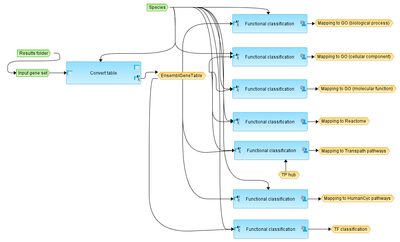Difference between revisions of "Mapping to ontologies (TRANSPATH(R)) (workflow)"
(Adding provider-specific categories) |
(geneXplain -> GeneXplain in category name) |
||
| Line 37: | Line 37: | ||
[[Category:Workflows]] | [[Category:Workflows]] | ||
[[Category:Autogenerated pages]] | [[Category:Autogenerated pages]] | ||
| − | [[Category: | + | [[Category:GeneXplain workflows]] |
Revision as of 11:14, 19 April 2013
- Workflow title
- Mapping to ontologies (TRANSPATH(R))
- Provider
- geneXplain GmbH
Workflow overview
Description
This workflow is designed to classify an input gene set to several ontologies and to identify terms, hits for which are overrepresented in the input set. The input file can be any gene or protein table.
At the first step, the input table is converted into a table with Ensembl Gene IDs.
This table with Ensembl Gene IDs is subjected to functional classification, which is done in parallel by the following ontologies: GO biological processes, GO cellular components, GO molecular functions, Reactome pathways, HumanCyc pathways, Transpath pathways, TF classification.
For each ontological term several parameters are calculated, including expected number of hits, actual number of hits, p-value, as well as hit names and the link to the corresponding ontological term.
Mapping to ontologies for multiple gene sets
This workflow is designed to classify input gene set to several ontologies and to identify terms, hits for which are overrepresented in the input set. The input is a folder containing several gene or protein tables, and these tables are taken automatically by the workflow, one input table after another, in a cycle.
At the first step, one of the input tables from the input folder is converted into a table with Ensembl Gene IDs.
This table with Ensembl Gene IDs is subjected to functional classification, which is done in parallel by the following ontologies: GO biological processes, GO cellular components, GO molecular functions, Reactome pathways, HumanCyc pathways, TF classification.
For each ontological term several parameters are calculated, including expected number of hits, actual number of hits, p-value, as well as hit names and the link to the corresponding ontological term.
The same steps are repeated for the next input table, and several cycles are performed automatically corresponding to the number of tables in the input folder.
This workflow is available together with a valid TRANSPATH® license.
Parameters
- Input gene set
- Species
- Results folder
